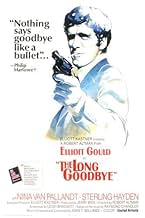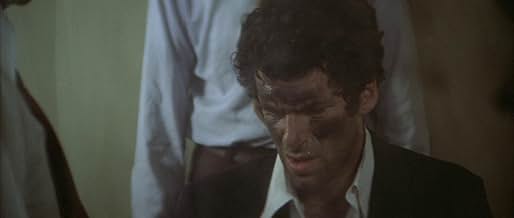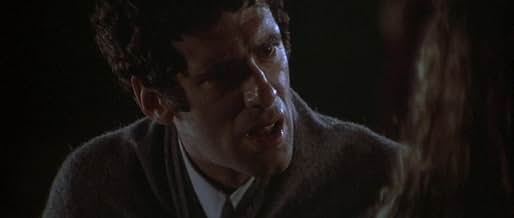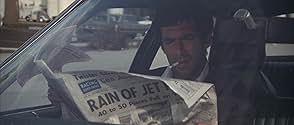Private eye Philip Marlowe helps friend Terry Lennox out of a jam and is implicated in his wife Sylvia's murder. He also is hired by Eileen Wade to locate her dipsomaniac husband Roger, who ... Read allPrivate eye Philip Marlowe helps friend Terry Lennox out of a jam and is implicated in his wife Sylvia's murder. He also is hired by Eileen Wade to locate her dipsomaniac husband Roger, who frequently disappears when he wants to dry out.Private eye Philip Marlowe helps friend Terry Lennox out of a jam and is implicated in his wife Sylvia's murder. He also is hired by Eileen Wade to locate her dipsomaniac husband Roger, who frequently disappears when he wants to dry out.
- Director
- Writers
- Stars
- Awards
- 2 wins & 1 nomination total
- Detective Farmer
- (as Steve Coit)
- Vince
- (as Vince Palmieri)
- Doctor
- (as Pancho Cordoba)
- Director
- Writers
- All cast & crew
- Production, box office & more at IMDbPro
Featured reviews
Times have really changed for Marlowe since 1946, when he was played by Humphrey Bogart. Then he was cool, implacable, wore a fedora a lot, and wound up with babe Lauren Bacall. That was the only strain of the plot viewers could follow. There were some dead bodies, smoking guns, and tough questions from cops along the way.
In this movie it's 1973, and Marlowe still think he's cool but that opinion is not so widespread this time - he's being played for a sucker by at least half the cast, including a longtime friend, and his own cat. He unravels the mystery mostly out of a lack of having anything better to do, which he clearly stood in need of.
Director Robert Altman follows his own ideas about how to communicate visually. Like when he changes scene to a hospital, he doesn't do any kind of establishing long shot, he shows a closeup of a light over a patient's bed. His montages create a kind of equivalent of our human experience, where we use our minds to focus on detail. He usually winds up with scenes that feel like we're watching something actually happen. But he does know how to use visuals for dramatic power when he wants, as the ending makes clear.
Some of the performances he gets from actors are amazing, like Mark Rydell as psychotically dangerous gangster Marty Augustine. The way he works himself into a rage with his rants changes gears from funny to frightening at high speed, and I can't believe it didn't influence Joe Pesci's performance in "Goodfellas."
Not everything works here, like Gould smearing fingerprint ink on his face then breaking into Al Jolson at police headquarters, but on the whole a fairly engrossing take on detective mysteries.
A warning for Raymond Chandler purists: you probably won't like this film. Altman and screenwriter Leigh Brackett had quite a task in adapting Chandler's second-last novel to the screen, for in it the 'knight errant' Phillip Marlowe comes over more like a prudish sap. Altman and Brackett have streamlined the narrative, removed peripheral characters, and crucially transformed Marlowe into a murkier, more comically ambiguous protagonist.
In Altman's and Gould's hands, Marlowe is laconically relaxed, murmuring, alternately amused and annoyed at the world. Like Chandler's hero, he is an outsider, a spectator, everywhere he goes. Unlike the literary Marlowe, Gould's character seems washed up on the shores of an unfamiliar land, his nobility as crumpled and stale as his suit.
Along for the ride are the archetypal Chandler villains and victims: self-hating celebrities, young wives trapped in loveless marriages, crooked doctors, low-rent psychopathic gangsters, bored cops, flunkies lost out of time. Typically, the milieux Marlowe moves in range from the affluence of the Malibu Colony to the cells of the County Jail. Altman, however, wishes to make a film in and about 1973; the film is shot through with the psychic reverberations of the end of hippiedom and the remoteness of the 'Me Generation'.
Another Altman touch is his openly expressed contempt for Hollywood and its conventions. As if to acknowledge the artificiality of a private detective story in the midst of 1970s Los Angeles, the film is suffused with jokey references to cinema. Bookended with 'Hooray for Hollywood', the film shows gatekeepers impersonating movie stars, characters changing their names for added class, hoods enacting movie clichés simply because that's where they learnt to behave. Even Marlowe himself refers to the artifice when talking to the cops: 'Is this where I'm supposed to say 'What's all this about?' and he says 'Shut up, I ask the questions' ?'
As for the supporting cast, Sterling Hayden shines out as the beleaguered novelist Roger Wade. There is more than a touch of Hemingway in Hayden's bluff, blustering, vulnerable old hack. Baseball champ and sportscaster Jim Bouton is casually mysterious as Marlowe's friend Terry Lennox, Laugh-In alumnus Henry Gibson is suitably greasy as Dr Verringer, actor/director Mark Rydell (best known for 'On Golden Pond') is convincingly chilling as gangster Marty Augustine, and Nina van Pallandt lends a dignified, defiant pathos to her role as Eileen Wade.
Special note must be made of Vilmos Zsigmond's tremendous photography, employing his early 'flashing' style of exposure to lend Los Angeles a suitably sultry, bleached-out aura. Also deserving attention is John Williams' ingeniously minimalist score. Comprised solely of pseudo-source music, the score is a myriad of variations on a single song, appearing here as supermarket muzak, there as a party singalong, elsewhere as a late night radio tune.
The film's controversial ending is utterly antithetical to Chandler's vision. The message from Altman, however, is loud and clear: Chandler's world no longer exists if indeed it ever did.
Altman's take on Chandler's other book with private eye Marlowe, The Long Good-bye, updates the action to the 1970's. He introduces a very 70's theme song and finds as different an actor as he can from Bogart for the role of Marlowe. From the opening frame, Elliot Gould plays Marlowe like a push-over. He's a man who constantly mutters to himself, suffers nervous tics, can't even fool his cat, is afraid of dog's and seems to be the only man not attracted to his sexy hippie neighbors despite their friendliness towards him and obvious promiscuousness.
However, Gould really creates a unique persona with the way he walks, talks, wise-cracks and operates. He becomes a believable person - which is why the uncharacteristic ending is so impacting. The photography, especially the night scenes, are beautifully filmed. The theme music plays everywhere - a Mexican funeral, a doorbell, a car radio etc and with different singers. There are other layers of flesh added to the telling that really work - like the compound security guards impressions of James Stewart, Barbara Stanwyck, Cary Grant and best of all Walter Brennan aka Stumpy from Rio Bravo.
This movie worked great for me and the plot, intricate though it was, was understandable. I will not compare this Marlowe to Bogart's, but do find it admirable that Altman just stuck to the goal of making a good movie without trying to ape or make obvious references to the noir genre.
Filmmaker Robert Altmans' take on the whole Neo-Noir genre does take some getting used to. It's a lot more irreverent, and goofy, than some people will expect. Devotees of Chandler and classic film noir will likely be dismayed. Scripted by the legendary Leigh Brackett, the dialogue does flow from the mouths of the cast with real ease, and it is reasonably entertaining to watch as this thing develops. After a while, however, even a viewer such as this one can see where the story is headed.
Goulds' version of Marlowe is a real change of pace. He's a quirky, hip, unflappable wise-ass who's willing to head to an all-night supermarket to obtain the only brand of cat food that his pet will eat. And he's just one memorable character in this interesting stew of a film. Hayden plays his washed-up writer for everything that it's worth. Film director Mark Rydell ("The Rose") is clearly relishing his meaty acting role as a brutal Jewish gangster. Henry Gibson ("The Blues Brothers") is an effective weasel as a doctor who expects to be PAID for his services. Danish actress Van Pallandt is alluring as the femme fatale of the piece. And there are a couple of very familiar faces in small roles: Jack Riley ('The Bob Newhart Show'), Rutanya Alda ("Mommie Dearest"), David Carradine as a chatty convict, and even Arnold Schwarzenegger as one of Rydells' goons.
Set in a sunny but rather seedy California of the 70s (complete with spacey hippie neighbours for Marlowe), this is an entertainingly convoluted tale, and a rather slowly paced one, but it always remains...interesting. It's definitely an unusual spin on the typical noir film.
Seven out of 10.
A simple scene, one I thought was simply Altman quirkiness, in '73...but, in fact, it neatly foreshadows the major theme of the film: betrayal by a friend, and the price. As events unfold, Marlowe would uncover treachery, a multitude of lies, and self-serving, amoral characters attempting to 'fool' him...with his resolution decisive, abrupt, and totally unexpected! The casting is first-rate. Elliott Gould, Altman's only choice as Marlowe, actually works extremely well, BECAUSE he is against 'type'. Mumbling, bemused, a cigarette eternally between his lips, he gives the detective a blue-collar integrity that plays beautifully off the snobbish Malibu 'suspects'. And what an array of characters they are! From a grandiosely 'over-the-top' alcoholic writer (Sterling Hayden, in a role intended for Dan Blocker, who passed away, before filming began), to his sophisticated, long-suffering wife (Nina Van Pallandt), to a thuggish Jewish gangster attempting to be genteel (Mark Rydell), to a smug health guru (Henry Gibson), to Marlowe's cocky childhood buddy (Jim Bouton)...everyone has an agenda, and the detective must plow through all the deception, to uncover the truth.
There are a couple of notable cameos; Arnold Schwarzenegger, in only his second film, displays his massive physique, as a silent, mustached henchman; and David Carradine plays a philosophical cell mate, after Marlowe 'cracks wise' to the cops.
The film was a failure when released; Altman blamed poor marketing, with the studio promoting it as a 'traditional' detective flick, and audiences (including me) expecting a Bogart-like Marlowe. Time has, however, allowed the movie to succeed on it's own merits, and it is, today, considered a classic.
So please give the film a second look...You may discover a new favorite, in an old film!
Did you know
- TriviaThe location for Roger Wade - Sterling Hayden's home was actually Robert Altman's home at the time.
- GoofsDuring the scene where Marlowe is chasing Mrs. Wade in her top-down Mercedes 450 SL convertible, the car goes from having head rests to having no head rests in various shots.
- Quotes
Philip Marlowe: Nobody cares but me.
Terry Lennox: Well that's you, Marlowe. You'll never learn, you're a born loser.
Philip Marlowe: Yeah, I even lost my cat.
- ConnectionsEdited into El adios largos (2013)
- SoundtracksThe Long Goodbye
by John Williams and Johnny Mercer
Performed by The Dave Grusin Trio, Jack Sheldon, Clydie King, Jack Riley, Morgan Ames, Aluminum Band, The Tepoztlan Municipal Band
Details
- Release date
- Country of origin
- Languages
- Also known as
- Un largo adiós
- Filming locations
- 2178 High Tower Drive, Hollywood, Los Angeles, California, USA(Marlowe's residence)
- Production companies
- See more company credits at IMDbPro
Box office
- Budget
- $1,700,000 (estimated)
- Gross worldwide
- $27,504


































